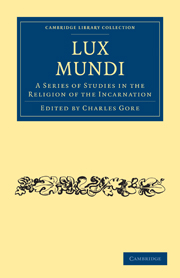Book contents
- Frontmatter
- ESSAYS AND CONTRIBUTORS
- PREFACE
- PREFACE TO THE FIFTH EDITION
- PREFACE TO THE TENTH EDITION
- Contents
- I FAITH
- II THE CHRISTIAN DOCTRINE OF GOD
- III THE PROBLEM OF PAIN
- IV PREPARATION IN HISTORY FOR CHRIST
- V THE INCARNATION AND DEVELOPMENT
- VI THE INCARNATION AS THE BASIS OF DOGMA
- VII THE ATONEMENT
- VIII THE HOLY SPIRIT AND INSPIRATION
- IX THE CHURCH
- X SACRAMENTS
- XI CHRISTIANITY AND POLITICS
- XII CHRISTIAN ETHICS
- APPENDIX I ON SOME ASPECTS OF CHRISTIAN DUTY
- APPENDIX II ON THE CHRISTIAN DOCTRINE OF SIN
III - THE PROBLEM OF PAIN
Published online by Cambridge University Press: 29 August 2010
- Frontmatter
- ESSAYS AND CONTRIBUTORS
- PREFACE
- PREFACE TO THE FIFTH EDITION
- PREFACE TO THE TENTH EDITION
- Contents
- I FAITH
- II THE CHRISTIAN DOCTRINE OF GOD
- III THE PROBLEM OF PAIN
- IV PREPARATION IN HISTORY FOR CHRIST
- V THE INCARNATION AND DEVELOPMENT
- VI THE INCARNATION AS THE BASIS OF DOGMA
- VII THE ATONEMENT
- VIII THE HOLY SPIRIT AND INSPIRATION
- IX THE CHURCH
- X SACRAMENTS
- XI CHRISTIANITY AND POLITICS
- XII CHRISTIAN ETHICS
- APPENDIX I ON SOME ASPECTS OF CHRISTIAN DUTY
- APPENDIX II ON THE CHRISTIAN DOCTRINE OF SIN
Summary
The problem of pain, always prominent in a sensitive age, has been exceptionally emphasized in the literature of modern pessimism as an objection to Theism in general, and Christianity in particular. The existence of pain is urged as incompatible with the belief in a God who is at once omnipotent and benevolent, that is with Theism in its ordinary form; while Christianity is further charged with being a religion of pain, a religion which has increased the sum of actual, and the expectation of prospective pain, darkening the shadow that lies upon our race. Suffering is not a subject upon which anything new can be said. It has long ago been probed, to the utmost limit of our capacity, and remains a mystery still. But, in face of the adverse use now made of it, it may be well to bear in mind how much has been said and is to be said upon the other side.
To begin with, there are two classes of pain, animal and human, which however intimately they may be connected must, for clearness, be considered apart. The universality of pain throughout the range of the animal world, reaching back into the distant ages of geology, and involved in the very structure of the animal organism, is without doubt among the most serious problems which the Theist has to face.
- Type
- Chapter
- Information
- Lux MundiA Series of Studies in the Religion of the Incarnation, pp. 82 - 92Publisher: Cambridge University PressPrint publication year: 2009First published in: 1889



